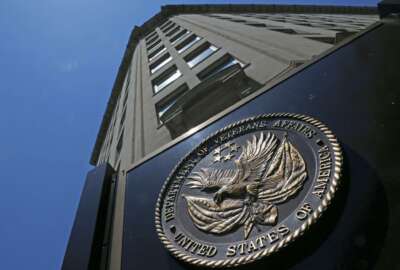
VA says it’s altering policies after widespread failure to report bad doctors
Responding to a scathing audit, VA says it will investigate and discipline hospital administrators who do not report doctors' misconduct or malpractice to a...
Subscribe to Federal Drive’s daily audio interviews on iTunes or PodcastOne.
The Veterans Affairs Department says it is tightening up its procedures to report doctors’ professional misconduct to a national database and to state licensing boards in the wake of an audit that found a pattern of lax oversight let VA doctors with a record of substandard care secure jobs at other facilities.
The audit, by the Government Accountability Office, called for “immediate, decisive action” because of serious risks that veterans could be put in harm’s way. Among the changes, the department will no longer allow settlement agreements in which poor-performing doctors are allowed to resign in exchange for not having their misconduct reported to the database or to state authorities.
GAO says that’s exactly what happened in some of the cases it reviewed during its visits to five VA medical centers. Overall, out of the nine cases it reviewed, in which doctors either were disciplined or resigned over professional competence or misconduct issues, only one was actually reported to the National Practitioner Data Bank (NPDB).
“Even in the one case where we found a VAMC had reported the provider, it took 136 days from the time the appeals process was completed to the actual report, far beyond the current 15-day VA reporting requirement,” said Randall Williamson, director of health care issues at GAO. “And VA has no similar policy for how soon providers should be reported to the state licensing boards after the adverse action process is completed.”
GAO says that pattern is disturbing, because absent any record of the adverse actions, other facilities could hire the dismissed doctors without any knowledge of their history of poor performance or malfeasance. The office knows of at least two cases in which that happened: One such physician was able to obtain privileges to practice at another VA medical center, another worked in a private facility treating veterans under the department’s care in the community programs.
But auditors say it’s difficult to know the total number of potentially dangerous doctors who should have been reported to boards and NPDB and weren’t. That’s because at each location GAO examined, administrators appeared to be routinely failing to even conduct the required reviews of medical providers who had had concerns raised about their competence, and those that were conducted weren’t done in a timely manner.
“We found that during the four-year period ending March 2017, the five VAMCs we reviewed collectively required clinical reviews of 148 providers after concerns were raised about their care. For almost half these cases, officials could not provide documentation that the reviews were actually conducted,” Williamson said. “We found 16 cases where reviews were delayed more than three months, and in some cases, years. After concerns were raised for two providers, reviews were initiated 3 1/2 years later, and then only after we requested documentation on those cases. Bottom line: VAMCs have been lax in conducting these reviews, and VA has no policy governing how soon reviews should occur after clinical care concerns have been raised. That needs to change.”
VA officials say it has always been against the department’s policy to strike agreements with departing doctors that allow their misconduct to go unreported, but officials said on Wednesday that they would discipline any medical center managers who agree to those types of settlements. And any agreements involving payments of more than $5,000 will be reviewed by VA’s headquarters in Washington.
Dr. Gerald Cox, VA’s acting deputy undersecretary for health for organizational excellence, said the department will also expand the range of medical providers that it reports to the national database, beyond what’s required by federal law.
“We’re doing this because we feel it’s the right thing to do for veterans,” he said in testimony before the House Veterans Affairs Committee. “This means that we will report to the National Practitioner Data Bank all privileged providers for adverse privilege actions, all privileged providers who resign or relinquish privileges while under investigation, and any licensed provider who was terminated from a VA facility for substandard care, professional incompetence or professional misconduct, thus excluding them from future participation in the VA’s community care programs. VA will also improve the timeliness of both the decision-making on whether to report providers and the process of reporting providers, shortening the timeframe of that process.”
Cox said the department expects to rewrite its policies to implement the faster procedures by September 2018.
As for reporting concerns about physicians’ competence, he says the department actually has a good track record — between 95 and 98 percent — when it comes to providers who’ve been the subject of malpractice lawsuits. But as of Wednesday, he was not able to say how many physicians have been reported because of investigations into concerns about the quality of their care, but who have not been sued, because the department, thus far, has not tracked or overseen those procedures at its central office.
Latest Oversight News
VA already has policies in place requiring those reports to be made to the national database, to state licensing boards and, via a formal data-sharing agreement, to the Federation of State Medical Boards.
Dr. Humayun Chaudhry, the federation’s president and CEO, said those policies have been in place for more than a decade.
“In consultation with several state medical boards, we have confirmed what has been reported by the GAO: That the VA does not always alert state boards in a timely fashion about violations, disciplinary actions, or suspected violations of [state medical laws],” he said. “While the VHA handbook outlines notification requirements, in practice, the state boards tell us many VA sites have not adhered to these standards. Some are a little better than others in terms of information-sharing, but we have found it rare for a board to receive up-front or helpful information from the VA in a timely manner. When information is shared with a state medical board, it is often well past the 100-day notification requirement designated by the VA. Providers who are unqualified or unsafe to practice medicine in the VA should not be allowed to practice outside of or elsewhere in the VA, nor should such providers be able to conceal their disciplinary actions with secret settlement arrangements.”
GAO’s Williamson said despite the longstanding policies, the reporting lapses were allowed to happen systematically across the country because of what he called “poor oversight and accountability from top to bottom.”
“For example, neither the [regional Veterans Integrated Service Network] nor the VA central office routinely performs any oversight to ensure that reviews are conducted in a timely way,” he said. “Moreover, VA policy does not require that VISNs oversee reporting to the data bank or state licensing boards. Because of that, none of the VISNs we reviewed did so. While VA has agreed with our recommendations and promised to make needed improvements, we believe that immediate decisive actions are needed to remedy the serious problems we identified. Otherwise, VAMCs are potentially putting veterans in harm’s way by exposing them to substandard and unsafe care.”
Copyright © 2025 Federal News Network. All rights reserved. This website is not intended for users located within the European Economic Area.
Jared Serbu is deputy editor of Federal News Network and reports on the Defense Department’s contracting, legislative, workforce and IT issues.
Follow @jserbuWFED
Related Stories





